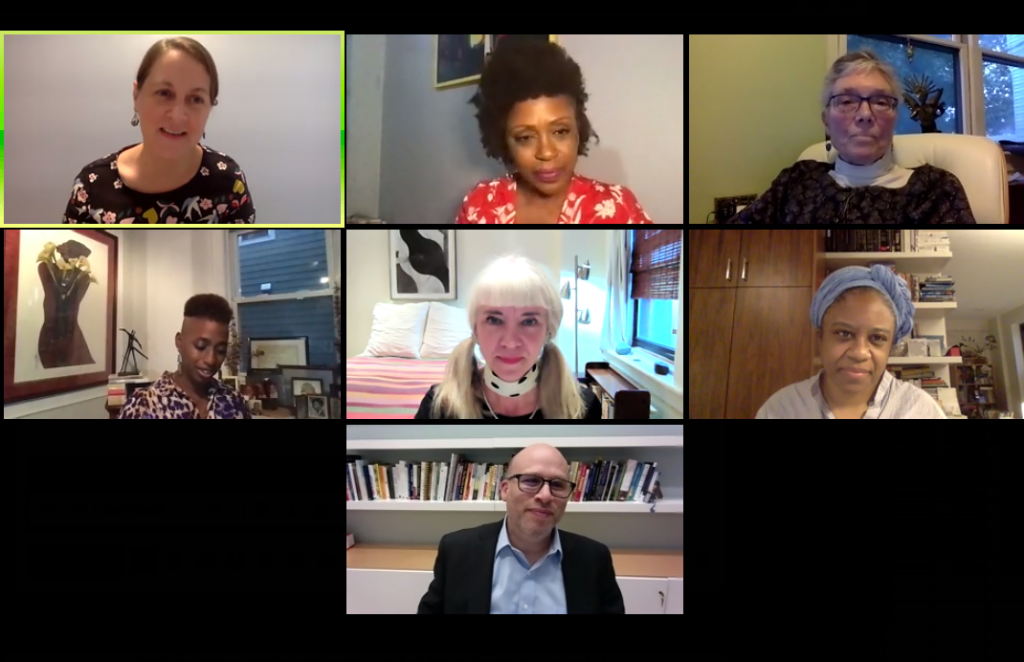 On October 27, over 200 Bank Street faculty, staff, alumni, families, and trustees gathered online for a discussion titled, “2020 Post-Election Civility: A Virtual Panel for Talking to Children About the November 3 Election.” Hosted by the Bank Street Alumni Relations Office, the event convened a panel of Graduate School alumni with a wealth of knowledge and experience to share insight on self-care on the importance of creating space for inclusive and constructive conversations with children in the wake of the 2020 election.
On October 27, over 200 Bank Street faculty, staff, alumni, families, and trustees gathered online for a discussion titled, “2020 Post-Election Civility: A Virtual Panel for Talking to Children About the November 3 Election.” Hosted by the Bank Street Alumni Relations Office, the event convened a panel of Graduate School alumni with a wealth of knowledge and experience to share insight on self-care on the importance of creating space for inclusive and constructive conversations with children in the wake of the 2020 election.
The evening began with opening remarks from Shael Polakow-Suransky, GSE ’00, who detailed the divisive nature of this year’s election and how, now more than ever, our community needs to remain steadfast in our mission to use education as a lever to improve the world around us. “Part of what makes me so proud of this community is the deep relationships and authentic learning that are at the heart of all of our work and our shared values which begin with the belief that education is an opportunity to build a better society.”
Cecelia Traugh, Dean, Graduate School of Education, also welcomed guests and shared a few words about this complicated moment, emphasizing that, during these politically-charged times, varied perspectives are a key component of fruitful discussions. She said, “If there isn’t a range, an expression of differing ideas, then the discussion is neither inclusive nor deep,” before opening up the floor to the evening’s panelists.
The panel discussion was moderated by Abigail Kerlin, GSE ’00, Co-Director/Instructor, Graduate School of Education, who posed previously-submitted questions to the panelists. These questions gave panelists the opportunity to share their perspectives, many of them detailing what has been most effective for them in the past when engaging in this type of work.
For example, panelist Jacqueline Allen-Joseph, GSE ’95, former principal of PS 261, spoke about her experience with her students following the 2016 presidential election. She felt that, during this time, restorative circles were a useful practice in helping her students process the results of the election. “I had so much conviction around creating a space that was safe for everyone,” said Allen-Joseph.
Allen-Joseph also noted that, while the political challenges our nation faced over the last four years were daunting, they also paved the way for the rise of Black Lives Matter and other movements that brought attention to racial and cultural justice and equity in our country.
Panelist Ali McKersie, GSE ’98, Humanities Teacher, Bank Street School for Children, also shared a story about how she helped her students through heightened emotions following the 2016 election. In this moment, McKersie decided to collaborate with another grade 8 teacher based in a conservative community in rural Virginia to launch Building Bridges, a 12-month project in which both classes corresponded virtually to discuss complex political topics. These included the Muslim ban, racial profiling, the Charlottesville Unite the Right Rally, the Las Vegas shootings, and other stories ripped straight from the headlines.
What evolved from the project were rich conversations, remarkable collaborations, and creative solutions based on new ideas. “I’d be lying if I didn’t say that it all felt very risky,” she said. “I think it’s kind of amazing how young people are so much better than adults at finding joyful, fully embodied ways to agree to disagree.”
Other panelists were quick to share their thoughts on how educators can appropriately address the big and important questions children were asking. Erica Davis, GSE ’11, Bank Street College Alumni Association (BSCAA) President and principal at PS 261, reminded adults to be open and composed as they create spaces to address complex topics like power, democracy, and racism, and how we can make changes in our communities. She admitted that, while there are still so many unknowns about our political landscape, we need to encourage students to ask questions. “We’re all in different places on this journey,” she said about the constant cycle of learning and self-growth.
For panelist Davia Brown-Franklyn, GSE ’97, Senior Director of Partnerships, Bank Street Education Center, it’s crucial for adults to model an appropriate demeanor for children during these times, even if they don’t feel civil. “The biggest thing for us to do (as adults) is to wrestle with our emotions about how we are feeling internally and how that shows up so that kids can actually ask questions, and are invited to have a difference of opinion,” said Brown-Franklyn.
She continued, “It’s always easier at Bank Street because we lean into structures we already know. There are places where they don’t have Community Circles with their kids. They don’t have town hall conversations or advisory groups. For folks who don’t have those structures yet, they need to begin to start thinking about it.”
The entire discussion can be viewed here. You can find additional resources for discussions here.
Photo Caption
Pictured: Abigail Kerlin (Moderator), GSE ’00, Co-Director/Instructor, Bank Street Graduate School of Education; Jacqueline Allen-Joseph, GSE ‘95, Equity Practitioner Consultant; Davia Brown Franklyn, GSE ’97, Senior Director of Partnerships, Bank Street Education Center; Ali McKersie, GSE ’98, Humanities Teacher, Bank Street School for Children; Erica Davis, GSE ’11, Bank Street College Alumni Association (BSCAA) President, and Principal, PS 261